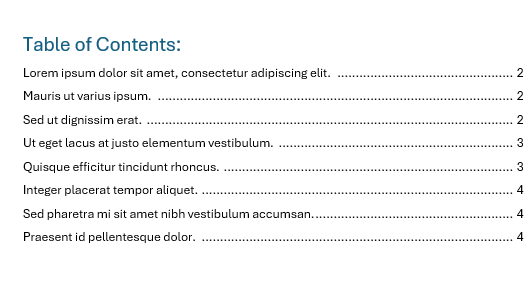Generating a Table of Contents in a Merged Document Using RadWordsProcessing
Environment
| Version | Product | Author |
|---|---|---|
| 2024.2.426 | RadWordsProcessing | Desislava Yordanova |
Description
This article shows how to merge two DOCX documents into a single document and generate a unified TOC that correctly reflects the merged content.
Solution
To merge two Word documents and generate a unified TOC, follow these steps:
- Import the documents using the DocxFormatProvider.
-
Merge the documents using the
Mergemethod with appropriate MergeOptions. - Insert a unified TOC at the desired location in the merged document.
- Update the TOC field to reflect the merged content accurately.
Here is an example code that demonstrates this process:
using Telerik.Windows.Documents.Flow.Model;
using Telerik.Windows.Documents.Flow.Model.Editing;
using Telerik.Windows.Documents.Flow.Model.Fields;
using Telerik.Windows.Documents.Flow.FormatProviders.Docx;
using System;
using System.IO;
using System.Linq;
class Program
{
static void Main(string[] args)
{
Telerik.Windows.Documents.Flow.FormatProviders.Docx.DocxFormatProvider DocxProvider = new Telerik.Windows.Documents.Flow.FormatProviders.Docx.DocxFormatProvider();
DocxProvider.ExportSettings.AutoUpdateFields = false;
// Importing the first document
RadFlowDocument doc1;
using (Stream input = File.OpenRead("file1.docx"))
{
doc1 = DocxProvider.Import(input);
}
// Importing the second document
RadFlowDocument doc2;
using (Stream input = File.OpenRead("file2.docx"))
{
doc2 = DocxProvider.Import(input);
}
// Merging documents
MergeOptions mergeOptions = new MergeOptions
{
ConflictingStylesResolutionMode = ConflictingStylesResolutionMode.UseTargetStyle
};
doc1.Merge(doc2, mergeOptions);
// Positioning and inserting the unified TOC
RadFlowDocumentEditor masterEditor = new RadFlowDocumentEditor(doc1);
Paragraph firstParagraph = doc1.EnumerateChildrenOfType<Paragraph>().FirstOrDefault();
masterEditor.MoveToParagraphStart(firstParagraph);
// Inserting a page break and the TOC title
masterEditor.InsertBreak(BreakType.PageBreak);
Run title = masterEditor.InsertText("Table of Contents:\n");
Style style = doc1.StyleRepository.AddBuiltInStyle(BuiltInStyleNames.TocHeadingStyleId);
title.Paragraph.StyleId = style.Id;
// Inserting the TOC
FieldInfo fieldInfo = masterEditor.InsertField("TOC");
masterEditor.InsertParagraph();
fieldInfo.UpdateField();
// Saving the merged document with the unified TOC
SaveDocument(doc1, "mergedFileLocation.pdf");
SaveDocument(doc1, "mergedFileLocation.docx");
}
private static void SaveDocument(RadFlowDocument document, string filePath)
{
string extension = Path.GetExtension(filePath).ToLower();
using (Stream output = File.Create(filePath))
{
if (extension == ".pdf")
{
Telerik.Windows.Documents.Flow.FormatProviders.Pdf.PdfFormatProvider provider = new Telerik.Windows.Documents.Flow.FormatProviders.Pdf.PdfFormatProvider();
provider.Export(document, output);
}
else if (extension == ".docx")
{
Telerik.Windows.Documents.Flow.FormatProviders.Docx.DocxFormatProvider provider = new Telerik.Windows.Documents.Flow.FormatProviders.Docx.DocxFormatProvider();
provider.Export(document, output);
}
}
// Open the saved file
System.Diagnostics.Process.Start(new System.Diagnostics.ProcessStartInfo { FileName = filePath, UseShellExecute = true });
}
}
This example demonstrates merging two DOCX files, positioning the document editor at the beginning of the merged document, inserting a page break followed by a unified TOC title, and finally, inserting the TOC field. The document is then saved as both a PDF and a DOCX file.
The achieved result is illustrated below:

Notes
- Ensure that the documents you are merging have compatible styles to avoid conflicts in the merged document.
- The TOC will need to be manually updated in the output document to reflect the current headings and page numbers accurately.